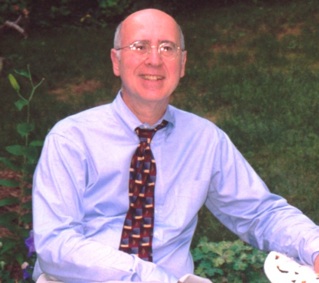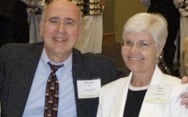
Because both Eric’s and my parents are divorced, we have had to find other role models in our lives to show us what a good marriage looks like. I have been lucky to know several happy couples in my life. Ben, my running partner who just died, had been married to the love of his life, Betty, for over 50 years. Except for the Valentine’s Day he gave her the old chocolate he found underneath the bed, Betty always said that “marrying Ben was the best thing I ever did.”
But the marriage I go to for counsel and instruction—especially when I don’t know how to handle a situation—is the partnership of Vickie and Mike. Their relationship reminds me of my favorite marriage quote, by Anne Morrow Lindbergh, on how marriage is a dance, an ebb and flow, each person taking turns stepping forward and back.
I feel incredibly lucky to have a mentor in my life like Mike because he has 30 years more experience in EVERYTHING than I do, so he knows many more answers. I find him to be so very wise.
So I thought I’d interview the guy that I’m always talking about: the co-editor (with moi) of I Like Being Married (although not to each other), my writing mentor, my spiritual director, and my marriage counselor … Mike Leach!
1) Hi Mike. Thanks for agreeing to share some of your wisdom with my Beyond Blue readers. A book in my future will be “Mike’s Rules for Relationships,” because I think that your rules are much more practical than those stupid rules on how to get a guy to marry you. For example, I often remember Mike’s Rule #1, when Eric and I are squabbling over something silly: “You don’t always have to be right. But you do always have to be loving.” You have said to me several times, and I can never repeat it enough, that it really doesn’t matter who “wins” the argument. What matters is that it gets resolved in a loving way. Right?
Wow, you remember more of what I say than I do! Thanks, Therese. I remember a line from A Course in Miracles: “Would you rather be right, or happy?” Marriage is a great classroom for learning to choose happiness. And like the song says, “It’s easy… all you need is love!” Of course, it helps to have a valid definition of love. I remember this one from Dr. Thomas Hora, author of Beyond the Dream: “Love is non-conditional, non-personal benevolence.” That helps me a lot.
2) Another wise rule that I remember over and over again, not only when Eric and I disagree on something, but in my dealings with the other persons in our lives—extended family and so forth is “Always err on the side of compassion.” I love that. HOWEVER, how do I follow that without becoming codependent? That’s my struggle, I think. I’m so used to letting the other guy win that sometimes I’m not sticking up for myself enough. But I see how it works for you. You are at the same time confident but compassionate. Oh, Mike. Will I ever be as evolved as you?
I’m about as evolved as a five-year-old! Remember when you took the train up to see us because I was obsessive thinking myself into madness over a fence in our backyard? Lucky for me, I sometimes learn from my mistakes, but not always. But one thing I have been learning that applies to your question is that the two most powerful healing values we can nurture are forgiveness and compassion. Again I like the definitions of Dr. Hora: “Forgiveness is giving up blaming.” And “compassion is understanding the lack of understanding.” Compassion is the highest form of love. Jesus expressed both on the cross when he said, “Father, forgive them, for they know not what they do.” Forgiveness – not blaming – and compassion – understanding the lack of understanding– prevent us from being co-dependent, and free us to love. That’s what you did for me when I couldn’t stop thinking about a stupid fence. It wasn’t your words that helped me, it was the love you expressed just by showing up. You understood my lack of understanding – you’d been there – and you didn’t blame me. You were simply present. Thanks again!
3) Rule #3: Take Turns. I see how you and Vickie do this beautifully. When she was upset about something that happened at work, you were there for her, and vice versa. You both had parents to take care of, and you do that without diluting your vow to each other in any way. You were a team. So you’d both travel south to do what needed to be done for her folks. And then you’d fly to Chicago to check on yours. I guess you and I do that in our friendship, although I always feel like it’s my turn. I think for every 40 turns I have, you have one. And in my marriage, since I am the one who is fighting a beast all the time, I feel like it’s always my turn. How do I make it farer? Or does it have to be fair?
As the great 20th century philosopher Robert De Niro says in Goodfellas, “Hey, it is what it is.” There is no fair, there is no turn. We simply respond to manifest needs. That too is a high form of love. First we fall in love. That’s the exciting part. Then we learn to love. That’s the hard part. Finally, we simply love being loving. And that, by far, is the best part.
4) You could have let a few people get in between you and Vickie. I guess I can say this now, because your mom’s deceased, right? She tried to drive a wedge between you and Vickie, but you guys wouldn’t let her. You stuck up for Vickie, and wouldn’t let her sneak between you. Rule #4 is “You are ONE. No one can get between you.” What would your advice be to people who have in-laws or friends or any issue, really, that can very easily drive a wedge between couples? HOW do they stay as a team?
That can be one of the biggest challenges in a marriage, and one that brings great consternation. It’s not easy, and you have to forgive and have compassion on yourself as well as on those who are trying to manipulate or provoke you. With a parent, we’re often trained to unconsciously blame ourselves for feeling anger and resentment toward them, and then we project it in the wrong direction, like at our spouse. It all hurts too much, it’s all too confusing, and we begin to lose our spiritual vision. So first we have to understand our own lack of understanding and not blame ourselves for our feelings. Then we have to remember what marriage is: it’s two people participating as one in the good of God, two people getting through life as one, two people learning to love as one. That includes expressing love to those who would hurt us, but it doesn’t require that we participate in their issues or their ways of seeing the world. It may require that we be forthright with them and not see them often – and not blame ourselves – or them – for doing so. As a postscript, I had a dream about my mother the other night (she’s been gone three years) and she appeared as young and beautiful and loving. Thank you, Mom!
5) Rule #5 is “Compromise.” It’s key, yes! I so admire how you and Vickie tackle conflicting schedules or plans or decisions. You measure who feels the strongest, and you allow that person to “win.” Again, you take turns. But that presumes your spouse is a generous giver and decent person like Vickie. What if you are married to a self-serving brat who wants everything her way? If you’re married to a selfish, thoughtless spouse?
Compromise is easy. If I want to go the show and see There Will Be Blood and Vickie wants to see Juno even more, we go see Juno, then see There Will Be Blood at another time, or on DVD. I can’t think of anything worth being willful about, and there’s nothing more pleasant than just sitting next to each other in a dark movie house as we have for 40 years and sharing hot popcorn and a diet Coke – as long as the movie isn’t Saw or something like that. Now if one of the partners is “a self-serving brat,” you’ve got a problem alright, and about all you can do is behold them in a loving way (see definition of love), and remember the Zen koan about “the sound of one hand clapping.” Don’t clap back.
6) What would you say is the most important advice for a happy marriage?
First you’ve got to be lucky, you’ve got to marry the right person, and then you’ve both got to be the right person. Someone asked George Burns what was the secret of his long and successful marriage. “That’s easy,” he said, “I married Gracie!” And I married Vickie — which does not, of course, leave me off the hook for being the right person! And what happens if over the course of a marriage one of the partners is committed to being the right person – kind, responsible, understanding, perseverant, faithful, and authentic – and the other is not? Divorce may be necessary. My parents divorced when I was five and I prayed until I was an adult that they get back together again. I loved both my parents and wanted to live with both of them in a harmonious family like so many of my friends did. Then I realized that just wasn’t in the cards, it wasn’t meant to be, it couldn’t have happened. “It is what it is.” God is in charge, and ultimately, we’ll all be alright because somehow someway “everything is already alright.” I’m learning that whether we’re married or single, divorced or widowed, we need be dependent only on God. God is Love.

